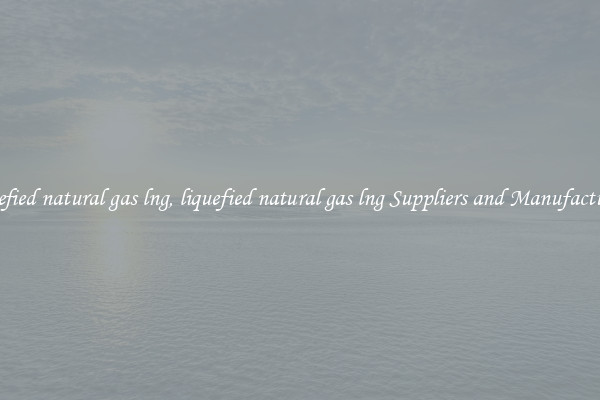liquefied natural gas lng, liquefied natural gas lng Suppliers and Manufacturers
Liquefied natural gas, or LNG, has emerged as a sustainable and efficient alternative to traditional fossil fuels. It is the liquid form of natural gas that results from cooling natural gas to -162 degrees Celsius, at which point it becomes condensed and can be efficiently transported and stored. LNG offers numerous advantages, including easy transportation and reduced carbon emissions, making it an attractive option for power generation and various industrial applications.

One of the key aspects of the LNG industry is the presence of numerous suppliers and manufacturers. These companies play a pivotal role in ensuring the availability and accessibility of LNG for global consumption. They operate at various stages of the LNG value chain, including production, liquefaction, transportation, and regasification.
Suppliers and manufacturers are responsible for producing and processing natural gas into LNG. They invest in liquefaction plants, where natural gas is purified and cooled to its liquid form. The liquefaction process reduces the volume of natural gas by approximately 600 times, making it easier to transport. These companies ensure the compliance of LNG with international safety standards, ensuring its quality and reliability.
Furthermore, LNG suppliers and manufacturers also focus on transportation and storage infrastructure. Specialized carriers, commonly known as LNG tankers, are used to transport LNG across long distances. These tankers are equipped with state-of-the-art insulation systems to maintain the low temperatures necessary for LNG's stability. Additionally, storage facilities are essential for maintaining a consistent supply of LNG during peak demands or unforeseen disruptions.
In recent years, the LNG industry has witnessed rapid growth due to increased worldwide demand. To meet this rising demand, suppliers and manufacturers have been expanding their production capacities and investing in new infrastructure. This expansion has led to an overall increase in LNG supply, reducing the dependence on traditional fossil fuels and promoting the transition towards cleaner energy sources.
Moreover, suppliers and manufacturers are exploring innovative methods to extract natural gas more sustainably. Techniques like natural gas exploration and extraction are employed to prevent environmental damage and minimize social impact. These companies actively seek efficient ways to reduce greenhouse gas emissions during LNG production and transportation, contributing to a greener and more sustainable energy sector.
In conclusion, LNG suppliers and manufacturers play a crucial role in the LNG industry's growth and success. They ensure the availability and reliability of LNG through the production, transportation, and storage of the liquid. As the demand for cleaner energy sources increases, these companies continue to invest in advanced technologies that further enhance the efficiency and sustainability of LNG. With their significant contributions, LNG suppliers and manufacturers are actively shaping the future of the global energy landscape.

View details

View details

View details

View details








